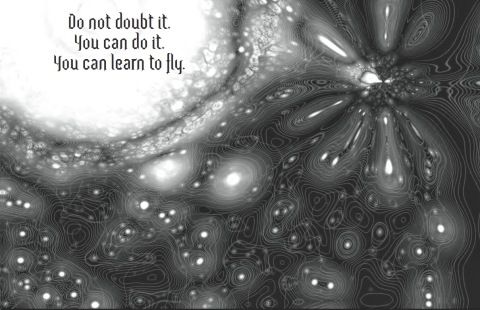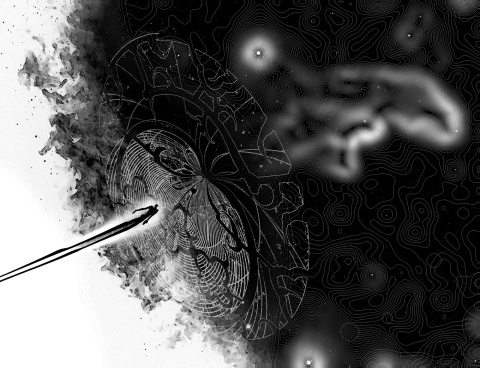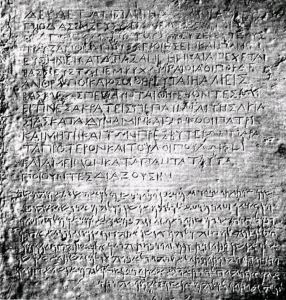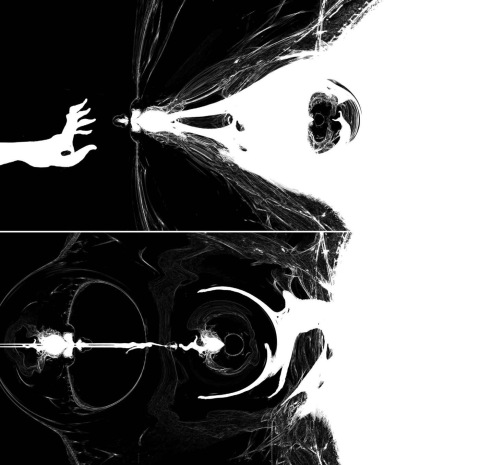 SF Said and Dave McKean teamed up for the brilliant Varjak books about a cat that learns who he really is, and who his friends are; Phoenix is their science fiction creation – and, for a child of, say, ten, what a great entry to the genre it is!
SF Said and Dave McKean teamed up for the brilliant Varjak books about a cat that learns who he really is, and who his friends are; Phoenix is their science fiction creation – and, for a child of, say, ten, what a great entry to the genre it is!
Lucky the young protagonist chases his destiny across the Galaxy with the same monomythical determination that Ged in A Wizard of Earthsea pursues the shadow creature. Like Varjak the book is, among many other things, about identity, in a world split along identity lines.
I recommend this short BBC radio talk by SF Said on the subject of identity. Also, his piece on identity and children’s books in the Guardian.

One of Dave McKean’s amazing astrolabe-inspired illustrations
In the book there are humans and aliens. But we find out that this division is not so simple. It’s an awareness we seem to need especially now, in our us-and-them times.
The last Reith Lectures – “Mistaken Identities” by the philosopher Kwame Anthony Appiah – had this theme too. He shows how our simple ideas of what creed, country, colour and culture are, are too simple. In Culture, he discusses the “Oriental-Occidental” divide that is obsessing the world at the moment.
We think of ourselves – us ‘Westerners’ as in some way heirs to classical culture. As Appiah says (pdf):
“More than six centuries later, Georg Wilhelm Friedrich Hegel, the great German philosopher, told the students of the high school he ran in Nuremberg, that, “The foundations of higher study must be and remain Greek literature in the first place, Roman in the second.”
Reading Silk Roads by Peter Frankopan recently, I became

Ashoka’s edicts – in Greek and Aramaic
aware of how much Alexander the Great had taken Greek culture east. I already knew that our only physical evidence for the maxims that were carved at the Greek temple of Delphi were in Afghanistan. But I learnt too that when the 3rd Century BC Indian ruler Ashoka posted his edicts in Pakistan and Afghanistan, they were in Greek and Aramaic for the Greek-speaking communities there.
(Of course, with the House of Knowledge in Baghdad, waves of Greek knowledge were reintroduced and accumulated eastwards as books on every subject in every language were translated into Arabic.)
Another thing from Appiah with a bearing on Varjak and Phoenix:
The stories we tell that connect Plato or Aristotle or Cicero or Saint Augustine to contemporary American culture have some truth in them, of course. There are self-conscious traditions of scholarship and argumentation. The delusion is to think that it suffices that we have access to these values, as if they’re tracks in a Spotify Playlist that we have never quite listened to.
If these thinkers are part of our Arnoldian culture, there’s no guarantee that what is best in them will continue to mean something to the children of those who now look back to them, any more than the centrality of Aristotle to Muslim thought for hundreds of years guarantees him an important place in Muslim cultures today.
Values aren’t a birthright: you need to keep caring about them.
A journey of discovery is needed to discover our ‘own’ heritage; a ticket is not enough. Varjak has to learn the Way of Jalal. Lucky needs to find his father, and a lot else besides.












Leave a comment